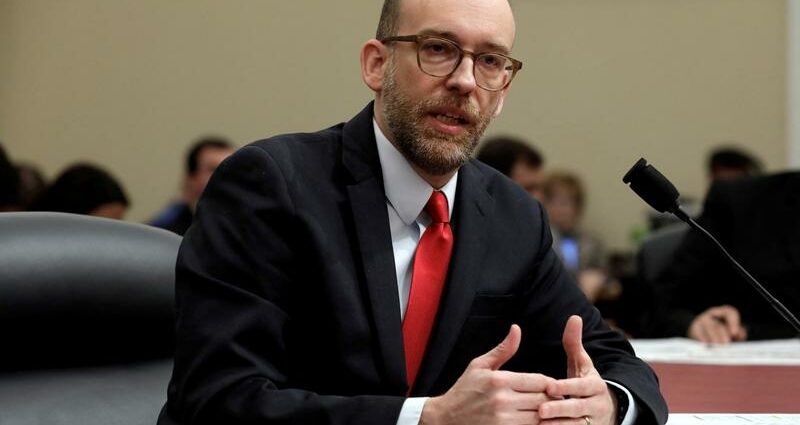WASHINGTON (Reuters) – U.S. House Republicans are eyeing $150 billion in spending cuts that reflect a hardline drive to target education, healthcare and housing – particularly efforts to address racial inequities that conservatives deride as “woke” – as they push forward in talks on the federal debt ceiling.
House of Representatives Budget Committee Chairman Jodey Arrington said Republicans are assembling a budget along the lines of a budget proposal developed by Russell Vought, who served as Republican President Donald Trump’s budget chief.
“It is consistent with what’s in his budget,” Arrington said in an interview. The congressman, whose party controls the House, did not provide specifics of what cuts he would suggest to his fellow Republicans, who return to Washington on Monday after a two-week break.
Republican House Speaker Kevin McCarthy has vowed not to allow an increase in the $31.4 trillion legal limit on federal borrowing without an agreement from President Joe Biden’s Democrats in Congress to rein in federal spending.
Failing to lift the debt ceiling could trigger a default on the federal government’s debt that would take a heavy toll on the American and probably world economies. A prolonged 2011 debt-cap standoff led to a cut in the government’s top-tier credit rating.
During Biden’s State of the Union speech early this month, Republicans loudly vowed not to pursue cuts to the Social Security retirement or Medicare healthcare programs. They also mostly oppose military cuts.
That leaves them scouring only a sixth of the budget for cuts.
Arrington said the $150 billion in cuts he is eyeing would mostly hit nondefense discretionary spending, whose programs cost about $900 billion in the last fiscal year ended Sept. 30.
Even eliminating those programs wouldn’t erase the roughly $1.6 trillion deficit – a measure of how far the government runs into the red each year.
BALANCE ‘ASPIRATIONAL’
That makes the conservative goal of a balanced budget within 10 years “aspirational” for now, Arrington said. Vought, whose plan also calls for $150 billion in cuts, said Democratic control of the Senate makes limited austerity more politically realistic.
“We’re in divided government. So what’s the easiest place to cut spending? It’s the bureaucracy, and that’s where we want to focus the fight,” Vought said in an interview, adding that he would go after programs he considered “significantly woke and unaccountable.”
Vought, who directed the Office of Management and Budget between 2019 and 2021 and now heads a conservative think tank, said the cuts he proposes would eventually slice the deficit by just a third if they were sustained for 10 years.
Biden and Senate Majority Leader Chuck Schumer say they will not discuss spending cuts until after the debt ceiling is raised, which is needed to cover the costs of spending and tax cuts previously approved by Congress.
Nonetheless, Treasury Secretary Janet Yellen said in an interview the fiscal year 2024 budget Biden plans to unveil on March 9 would contain “substantial deficit reduction over the next decade.”
TARGET LIST
Vought’s proposals move the debate forward from the back-and-forth on Social Security and Medicare that dominated much of the past month.
He did not provide a full accounting of the proposed $150 billion in cuts, but said it included about $25 billion from the Department of Education, including what he called “woke” policies such as score-improvement programs and culturally responsive schooling.
Republicans have increasingly used “woke” as a pejorative term regarding liberal views on race, gender and sexuality, for example attacking school courses about U.S. racial injustice and LGBTQ rights.
Vought said he would seek cuts to the departments of Housing and Urban Development and Health and Human Services, as well as to foreign aid, and to Centers for Disease Control and Prevention programs aimed at preventing chronic and sexually transmitted diseases.
He said his ideas have been best received in the conservative House Freedom Caucus.
Arrington said his goal is to return domestic spending to its fiscal 2022 level, while keeping defense spending flat, in the fiscal 2024 budget proposal House Republicans aim to unveil by April 15.
He said his main priority is producing a 2024 budget that can serve as a baseline for years of spending reductions.
“You can save over $1.5 trillion over that 10 years,” he said. “That’s real savings.”
Another Budget Committee Republican, Freedom Caucus member Ralph Norman, described in general terms a debt-ceiling playbook, backed by other conservatives, that aligned with Vought’s plan.
Like other committee hardliners, Norman wants to cut nondefense discretionary spending to pre-pandemic levels. The conservatives also want to hold defense spending steady and increase outlays on security along the U.S.-Mexico border.
McCarthy spokesman Mark Bednar said federal spending growth was “entirely unsustainable, and House Republicans were elected to bring it to an end.”
The House Budget Committee’s top Democrat, Brendan Boyle, expressed skepticism that the hardliners’ plan would win wide backing: “Republicans needed 15 rounds just to elect a speaker, so I can’t imagine they will have an easy time advancing a budget that all of their members will support.”
But budget committee and Freedom Caucus member Bob Good, one of 20 hardline conservatives who forced McCarthy to undergo 15 floor votes before being elected House speaker, said the political drama surrounding the speakership election should empower McCarthy to take a hard position with Biden and Schumer.
“When Kevin McCarthy says Republicans won’t vote for doing what we’ve always done and just raising the debt ceiling without meaningful spending cuts and reforms, I think the president and the Senate majority leader will recognize that he’s telling the truth,” Good said.
Source: Read Full Article
-
5 Sizzling ‘Strong Buy’ Stocks With Dividend Hikes Likely This Week
-
Treasuries Turn Lower Once Again Amid Ongoing Interest Rate Worries
-
5 Crypto Stocks in Focus After Fed’s Rate Hike Reinitiation
-
First Look Analysts Research Calls for Tuesday, January 31
-
Why Huge Energy MLP Deal Could Put 5 Big Dividend Payers in Play as Buyout Targets

